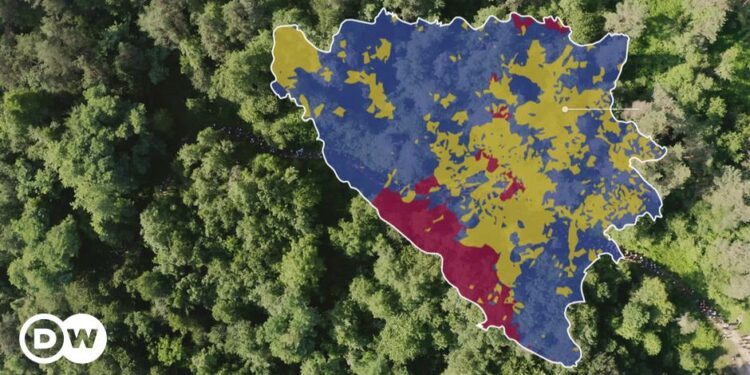In December 2022, some three million Bosnians received hopeful news: after years of waiting, the small multi-ethnic Balkan state is finally an EU candidate. However, peace in the Western Balkans is more fragile than at any time since the end of the Bosnian War in 1995, which left 100,000 dead and hundreds of thousands displaced.
Image: Java
Might Putin be trying to open a second front in the divided country? Why is Bosnia so central to so many geopolitical desires – both in the West (EU, UK, USA) and in places like Russia, Serbia, China and Turkey? And why is the country still suffering from the complex legacy of the 1995 Dayton Peace Agreement?
The Dayton Agreement (also known as the Dayton Treaty) ended the war in Bosnia and Herzegovina in 1995 after three and a half years.Image: Java
Interviews with the main players then and now unravel the secessionist aspirations of the Bosnian Serbs, the influence of EU member Croatia on the country and Bosnia’s structures of corruption. Bosnia-Herzegovina is the land of three peoples: Bosniaks, Serbs and Croats. It’s a meeting point of the Muslim, Orthodox, Christian and Jewish worlds. And it’s a place that shows that while it is difficult to end a war, it’s even more difficult to make a lasting peace.
Broadcasting Hours:
DW English
TUE 10.09.2024 – 01:15 UTC
TUE 10.09.2024 – 04:15 UTC
WED 11.09.2024 – 09:15 UTC
WED 11.09.2024 – 16:15 UTC
WED 11.09.2024 – 21:15 UTC
THU 12.09.2024 – 12:15 UTC
SAT 14.09.2024 – 08:15 UTC
SUN 15.09.2024 – 13:15 UTC
Lagos UTC +1 | Cape Town UTC +2 | Nairobi UTC +3
Delhi UTC +5,5 I Bangkok UTC +7 | Hong Kong UTC +8
London UTC +1 | Berlin UTC +2 | Moscow UTC +3
San Francisco UTC -7 | Edmonton UTC -6 | New York UTC -4
Source link : https://www.dw.com/en/bosnia-and-herzegovina-a-fragile-peace/a-69941340
Author :
Publish date : 2024-08-21 07:00:00
Copyright for syndicated content belongs to the linked Source.


